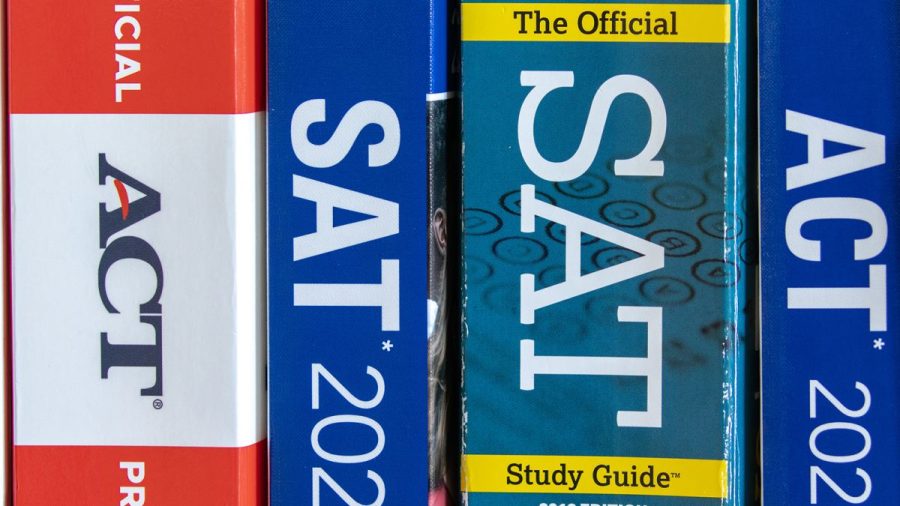Test-Optional Institutions—How Do They Affect Students?
Study guides used for the SAT and ACT.
Following the numerous challenges of the previous two years, the majority of colleges and universities in the nation have decided to extend their ‘test-optional’ policy for the 2021-22 application cycle. These institutions will not require prospective students to submit their SAT or ACT scores in order to apply.
Throughout the previous two school years, scheduling an in-person SAT or ACT test has been difficult or even impossible for many students. On top of that, many scheduled tests were inevitably canceled. While the situation has been recently improved, with in-person tests becoming more accessible, the test-optional policy still remains. However, several current seniors have not allowed the policy to affect their college application process.
“My preparations for college were not affected by the test-optional policy because I still wanted to send my scores to colleges,” said senior Mara Gray. “I felt that it would stand out that the pandemic did not hold me back from working to achieve good scores.”
Another senior, Josh Green, expressed a similar sentiment, choosing not to utilize the test-optional policy in his applications.
“It hasn’t affected my college preparations at all,” said Green. “I’m proceeding as if colleges are requiring the SAT.”
On a nationwide scale, however, thousands of students have used the test-optional policy to their advantage. Due to the need for SAT and ACT scores being eliminated, many students chose to apply to institutions to which they would not have applied otherwise. This has resulted in many of the nation’s top universities seeing record-high application totals.
This increased number of applications has resulted in very low acceptance rates at many elite universities. For example, during the 2020-21 application cycle all eight Ivy League schools admitted the lowest percentage of applicants they ever have. Due to declining acceptance rates, some students stated that they would have altered their application process if institutions were not test-optional.
“If I wasn’t given the choice between submitting or not submitting my scores, I would’ve tried for a score in the 1400s or higher to bolster my chances of getting into the colleges I applied to, despite my current scores not being bad,” said senior Brett Smith. “This is because I believe that with the test-optional policy, admissions will most likely not be very score-dependent, since a large portion of students are not sending in their scores.”
Some seniors, however, expressed that if they were required to send their scores to colleges, they still would not have altered their application processes.
“I don’t think I would have done anything differently,” said Green. “Even with the test-optional policy, I think colleges would like to see students that take the SAT as opposed to students who don’t.”
The policy and its effects on the application process as a whole have sparked debate about whether or not colleges and universities should require scores to be submitted for future applicants, even after the pandemic. Some institutions, such as Harvard University, have already opted to extend the policy for up to four more years. Many have argued that standardized tests such as the SAT and ACT are unfair or not truly indicative of a student’s academic merit, and thus should not be used to evaluate applicants for admission to a university.
“I think the test-optional policy is beneficial,” said Gray. “Especially because the SAT is pointless and unfair in my opinion.”
Similar claims have been made by those who think the policy is beneficial to students for reasons relating to the stress that standardized testing can inflict upon students.
“The test-optional policy is beneficial because it allows students to avoid the stress of getting a high SAT or ACT score,” said Smith. “This also allows colleges to focus on the applicant’s overall qualifications rather than a fairly subjective test.”
Green agreed with this, adding that “it can be beneficial to students who don’t work well under the SAT format.”
The policy continues to produce significant effects on both student plans and acceptance rates, and its implications and usage will likely continue to be debated for the remainder of the pandemic and beyond.








